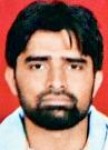Parroting the police version

HERE’S LOOKING AT US
Jyoti Punwani
The story of Fasih Mahmood has been making news for the last five months. The Indian Express reported it on its front page on May 24, in a story by Seema Chishti entitled “Where is Fasih Mehmood? 10 days later, all wife has is silence.” The silence made his wife move a habeas corpus petition in the Supreme Court where the government pleaded ignorance and complained about non co-operation from Saudi authorities.
The government’s changing stands and prevarications have been reported through these five months, and must have been familiar to journalists covering the terrorism beat. Yet, when Mahmood was extradited and arrested by the Delhi Police as a terrorist, the same newspapers reported the police version as if they had never reported on Mahmood before. No background information was given to show how mysterious the entire affair had been. For example, responding to Mahmood’s wife’s habeas corpus petition in the Supreme Court, the Additional Solicitor General had said that
The Chinnaswamy Stadium blast and the Jama Masjid blasts in which Mahmood is said to be involved, took place in April and September 2010 respectively. But the CBI woke up and jumped into action, asking Interpol to issue a red-corner notice against Mahmood, only after the latter’s wife approached the Supreme Court in May 2012. That should warrant some media comment.
As has become the practice over the last five years, headlines reported the extradition of this engineer accused of being an Indian Mujaheedin terrorist, without the word “alleged”. This word may be too long to include in headlines, but quotation marks serve the same purpose. There has been a marked absence of them. Disturbingly, some reports too dispense with the crucial word. Deccan Chronicle, The Times Of India, Deccan Herald, and New Indian Express describe Mahmood in the reports as an “Indian Mujaheedin operative” or “founder of the Indian Mujaheedin”. Surprisingly, even while interviewing his wife who claims his innocence, the TOI describes him as the “founder of the terror group, Indian Mujaheedin”.
In this predominance of the police version, only The Hindu spoke to Mahmood’s lawyer who pointed out the sparse evidence against his client. The Hindu is also the only one to quote the questions raised by the Jamia Teachers’ Solidarity Association (JTSA) about the entire affair. However, The Hindu, The Times of India, DNA, India Today, and Dainik Bhaskar carried interviews with Mahmood’s family. The Bhaskar even quoted the Bihar DGP saying he was unaware of any terror module in Bihar headed by Mahmood, who, he added, had no criminal record.
Just before Fasih Mahmood was deported to
So, one would have expected some reference to it when the same Special Cell struck again, within a month of it being exposed. Not at all. There was the same old parroting of police versions. This time, allegations reported in The Times Of
This report should have caught the eye of every crime reporter following the Pune blasts story. But two days later, when the Delhi Police announced that they had arrested Irfan Landge from Jaipur on October 10, very few reporters questioned them about the father’s allegations. Among those who did were of the Indian Express and the Sunday Guardian. The Times included the father’s version in its report. However, the next day, The Hindu and Pune Mirror did interview the father separately.
Will things ever change between the English press and the police when it comes to reporting on “anti-nationals” and “terrorists”? Editors say that crime reporters who question the police end up being cut off by the latter who are their main source of stories. Why don’t editors assign some other reporter the task of seeking corroboration from lawyers and relatives of the accused?
Such unquestioning reportage has created immense bitterness among English-reading Muslims, who attribute it to anti-Muslim prejudice. Considering that in the 1980s and early 90s Sikhs received the same treatment from the English press that charge is certainly not true, unless you expand it to say that English journalists are anti-minority. That’s evidently absurd. Who but the English press has consistently written about the 1984 anti-Sikh riots and the Gujarat 2002 massacre of Muslims?
The Urdu press isn’t considered credible by many English-reading Muslims. Besides, not every Muslim knows Urdu. So, their alternative to the English press are journals such as Milli Gazette, and news websites such as umeed.com, and twocircles.net, both run by Muslims. These report issues relating to Muslims, from an exclusively Muslim viewpoint. That’s as one-sided as reporting from a police viewpoint.
So, what’s the solution? As a first step, the community could try complaining to the Press Council every time such reportage takes place. For one of the first observations made by the current chairman was the way the media creates an impression that “all Muslims are terrorist and evil”.






